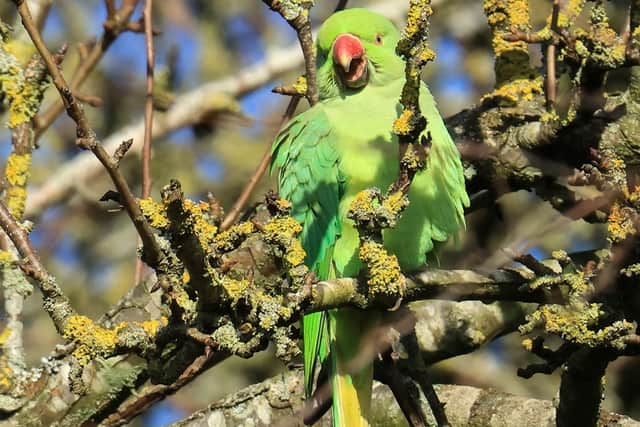Parakeets spotted in and around Birmingham - here's where the exotic birds are seen
and live on Freeview channel 276
It is the exotic bird that is out of Africa, yet has made an unlikely home in Birmingham.
Ring-necked parakeets have become the most unlikely visitor to bird tables in the area. And the squawking flocks get bigger with each year. The dazzling green birds shouldn’t be here, but they are. Elmdon Park, Solihull, has become a particular stronghold.
Advertisement
Hide AdAdvertisement
Hide AdYet ring-necked parakeets were only recorded as regularly breeding on these shores in 1979 in Kent. The population has been built on escapes from captivity. From their South East England stronghold, they have spread rapidly to the West Midlands. The birds are now nesting in Elmdon Park and Highbury Park, Moseley. They are regularly visiting East Birmingham gardens where they gorge on feeders filled with nuts. A sizeable flock has taken residence in Shard End.


Their numbers are increasing in Codsall, South Staffordshire. They have made it to Wolverhampton. And a 100-strong flock has been recorded in Sandwell Valley. The numbers have undoubtedly been bolstered by aviary escapes. The jury is out over whether they pose a problem or are an unexpected pleasure.
West Midlands Bird Club's Kevin Clements outlined the pitfalls. He said: "They are quite aggressive and they nest in holes in trees, depriving native species, which do the same, of nest sites.
"That impacts on birds like jackdaw, stock dove and nuthatch. They are becoming a bit of a problem," he admitted. "They'll eat fruit and come into gardens to eat nuts that have been put out. They can cause serious damage to orchards."
Advertisement
Hide AdAdvertisement
Hide AdExpert David Lal, from organisation New Life Parrot Rescue, said: "How is it that these birds are doing so well? How are they managing to find enough to eat during our winter?
"To be frank, I don't know the answer, but it is striking that the distribution, especially of ring-necked parakeets, is largely suburban rather than wholly rural. This suggests that humans and their gardens and garden bird tables may be very important."
The RSPB is, to an extent, sitting on the fence over a possible parakeet problem. It states: "They are sometimes loved and sometimes hated as garden visitors. There are concerns over how they may affect our native fauna, and of their impact on fruit-growers. As yet, there has been no problem either way, but as their numbers increase, they may become a problem in the future.”
Comment Guidelines
National World encourages reader discussion on our stories. User feedback, insights and back-and-forth exchanges add a rich layer of context to reporting. Please review our Community Guidelines before commenting.
